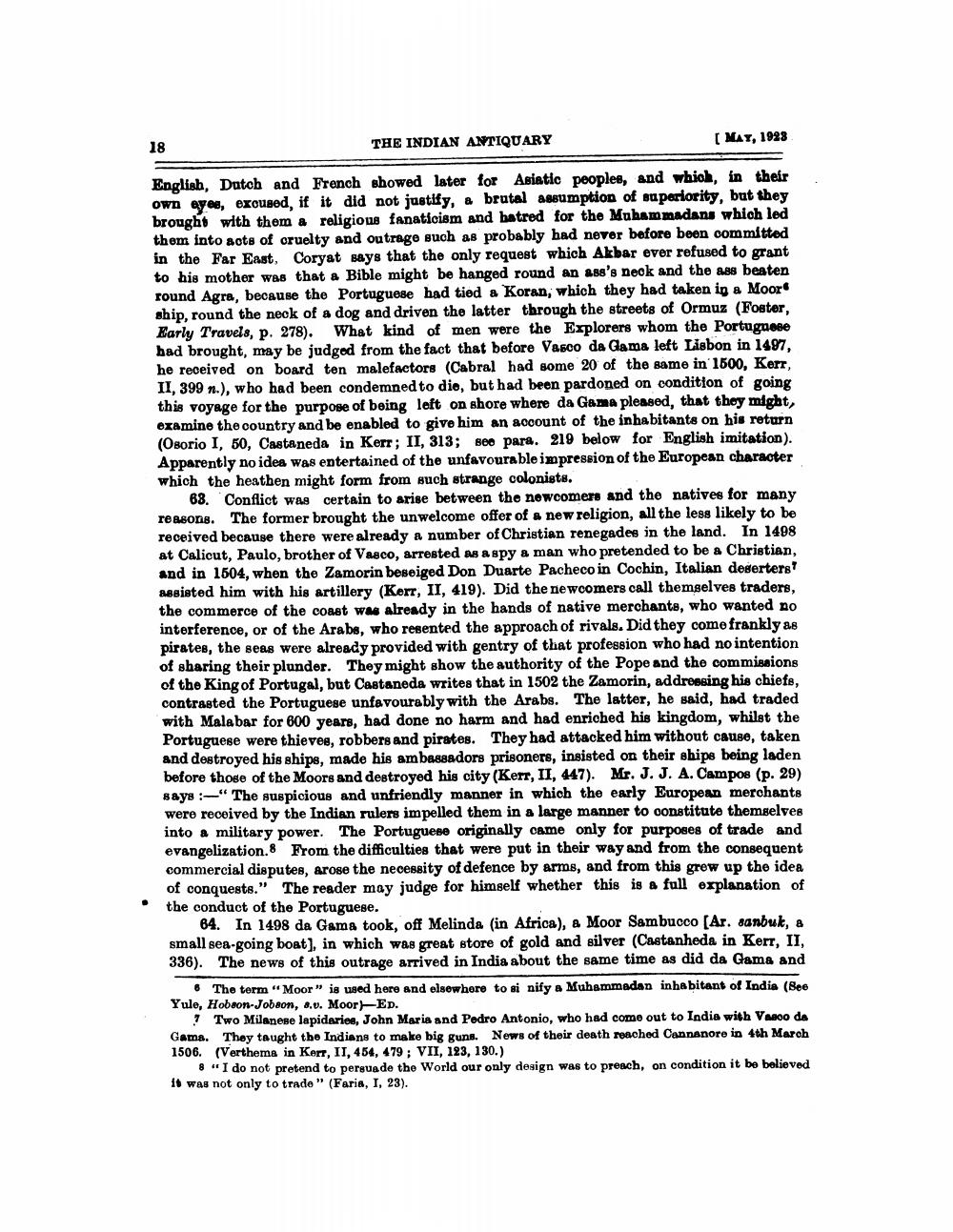________________
THE INDIAN ANTIQUARY
( MAT, 1928
English, Dutch and French showed later for Asiatic peoples, and which, in their own eyes, excused, if it did not justify, a brutal assumption of superiority, but they brought with them a religious fanaticism and batred for the Muhammadans which led them into acts of cruelty and outrage such as probably had never before been committed in the Far East, Coryat says that the only request which Akbar ever refused to grant to his mother was that a Bible might be hanged round an ass's neck and the ass beaten round Agra, because the Portuguese had tied a Koran, which they had taken in a Moor ship, round the neck of a dog and driven the latter through the streets of Ormuz (Foster, Karly Travels, p. 278). What kind of men were the Explorers whom the Portuguese bad brought, may be judged from the fact that before Vasco da Gama left Lisbon in 1497, he received on board ten malefactors (Cabral had some 20 of the same in 1500, Kerr, II, 399 n.), who had been condemned to dio, but had been pardoned on condition of going this voyage for the purpose of being left on shore where da Gama pleased, that they might, examine the country and be enabled to give him an account of the inhabitants on his return (Osorio I, 50, Castaneda in Kerr; II, 313; Bee para. 219 below for English imitation). Apparently no idea was entertained of the unfavourable impression of the European character which the heathen might form from such strange colonists.
68. Conflict was certain to arise between the newcomers and the natives for many reasons. The former brought the unwelcome offer of a new religion, all the less likely to be received because there were already a number of Christian renegades in the land. In 1498 at Calicut, Paulo, brother of Vasco, arrested as a spy a man who pretended to be a Christian, and in 1504, when the Zamorin beseiged Don Duarte Pacheco in Cochin, Italian deserters? Assisted him with his artillery (Kerr, II, 419). Did the newcomers call themselves traders, the commerce of the coast was already in the hands of native merchants, who wanted no interference, or of the Arabs, who resented the approach of rivals. Did they come frankly as pirates, the seas were already provided with gentry of that profession who had no intention of sharing their plunder. They might show the authority of the Pope and the commissions of the King of Portugal, but Castaneda writes that in 1502 the Zamorin, addressing his chiefs, contrasted the Portuguese unfavourably with the Arabs. The latter, he said, had traded with Malabar for 600 years, had done no harm and had enriched his kingdom, whilst the Portuguese were thieves, robbers and pirates. They had attacked him without cause, taken and destroyed his ships, made his ambassadors prisoners, insisted on their ships being laden before those of the Moors and destroyed his city (Kerr, II, 447). Mr. J. J. A. Campos (p. 29) saya :-"The suspicious and unfriendly manner in which the early European merchants were received by the Indian rulers impelled them in a large manner to constitute themselves into a military power. The Portuguese originally came only for purposes of trade and evangelization. From the difficulties that were put in their way and from the consequent commercial disputes, arose the necessity of defence by arms, and from this grew up the idea of conquests." The reader may judge for himself whether this is a full explanation of the conduct of the Portuguese.
64. In 1498 da Gama took, off Melinda (in Africa), a Moor Sambucco (Ar. sanbuk, a small sea-going boat), in which was great store of gold and silver (Castanheda in Kerr, II, 336). The news of this outrage arrived in India about the same time as did da Gama and
. The term "Moor" is used here and elsewhere to si nify a Muhammadan inhabitant of India (Bee Yule, Hobson-Jobson, 8.0. MoorED.
Two Milanese lapidaries, John Maria and Pedro Antonio, who had come out to India with Vasoo da Gams. They taught the Indians to make big guns. News of their death reached Cannanore in 4th March 1506. (Verthema in Kerr, II, 454, 479 ; VII, 123, 130.)
8 "I do not pretend to persuade the World our only design was to preach, on condition it be believed 10 was not only to trade" (Faria, I, 23).




